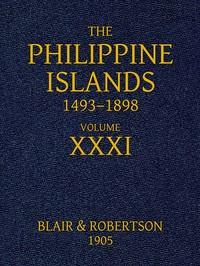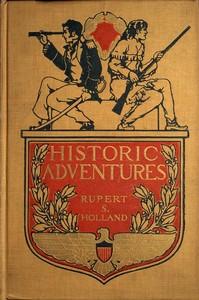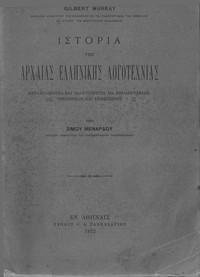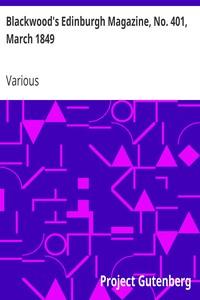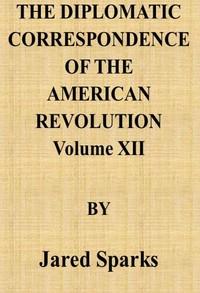|
|
Read this ebook for free! No credit card needed, absolutely nothing to pay.Words: 58920 in 5 pages
This is an ebook sharing website. You can read the uploaded ebooks for free here. No credit cards needed, nothing to pay. If you want to own a digital copy of the ebook, or want to read offline with your favorite ebook-reader, then you can choose to buy and download the ebook.

: The Philippine Islands 1493-1898: Volume 31 1640 Explorations by early navigators descriptions of the islands and their peoples their history and records of the Catholic missions as related in contemporaneous books and manuscripts showing the political ec@FreeBooksWed 07 Jun, 2023 Father Fray Juan de Castro, one of the first founders of this province The journey made by the father provincial Fray Alonso Ximenez to Camboxa The wars which followed in the prosecution of this embassy Our departure from the kingdom and the events which happened during our return to Manila The election as provincial of father Fray Bernardo de Sancta Catharina or Navarro, and the churches which were incorporated in the province On the fifteenth of June, 1596, the fathers assembled in the convent of Manila to elect a provincial, because father Fray Alonso Ximenez had finished his term. The definitors were: father Fray Diego de Soria, second time prior of the said convent; father Fray Bartholome de Nieva, a religious of very superior virtue, as will be narrated in due time; father Fray Juan de Sancto Thomas, or Ormaca; and father Fray Juan Garcia--all persons of conspicuous devotion to their religious duties, and of noble example. Several times they cast votes for the provincial without result. Because there were many who deserved the office, and because the votes were divided among them, no one had the number necessary for election. Those who had the largest number of votes were father Fray Diego de Soria and father Fray Juan de Sancto Thomas. These same persons endeavored to persuade everyone to vote for father Fray Bernardo de Sancta Catharina, who was accordingly elected. The election was a very satisfactory one, for, in addition to being a very holy man, he was very wise and learned, and most devoted to the ministry and preaching of the holy gospel--in which, and in patience, and in the endurance of the most severe hardships which befell him for this cause, no one ever surpassed him, and he surpassed many. During his time he had seen the province greatly favored by the Lord, by a very great spread of the Christian faith among the Indians who were under his care. Many of them in the villages where there were religious were baptized; and, where there were no religious, they were desirous and eager to receive baptism. Accordingly, at this chapter not only were new churches admitted which had been built in the towns where there were already religious--as, among the Chinese, the church of San Gabriel at Minondoc; and, in Bataan, the church in the village of Samal, besides others--but it also seemed good to admit heathen villages, although they had no religious, and there were none in the province so that teachers could be provided for them. Yet in this way they strove to comfort those who asked and desired them, and raised in them the hope that in this way they would receive religious when they came from Espa?a. Thus were received the church of San Vicente of the village of Buguey, afterward called Sancta Anna; Sancta Catarina of Nasiping, afterward called San Miguel; and others like them--to which, in the course of time, religious were sent when they came to the islands. Soon after this provincial chapter had come to an end, another shipload of religious arrived from Espa?a. They had been gathered with great care and diligence by the new bishop of Nueva Segovia, Don Fray Miguel de Venavides, whose new dignity had not sufficed to diminish the love which he felt for his associates. He gave to this matter more than ordinary attention, because he knew how greatly needed were good workmen to aid in the great harvest which the Lord had placed in their hands, ready to be gathered by the means of baptism into this church militant, that the faithful might pass from it to the church triumphant. The Indians themselves asked to have preachers sent to their villages, and were grieved that these could not be given to them. This not a little afflicted the religious, who desired to satisfy them by the fulfilment of their just desires, but were unable to do so on account of their own small number--too small even for that which they had undertaken, and much more to go to the aid of new regions. Besides this, the careful bishop was influenced by the need of his own sheep; for nearly everything to which we ministered fell within the bishopric of Nueva Segovia, which was under his direction. Accordingly, taking advantage of his authority as a bishop, and of the reputation which he had as a learned and holy religious, he gathered the second shipload, and afterward the third . Father Fray Pedro de Ledesma happened to be in Castilla when the shipload which the good bishop sent was about to sail. His presence was very convenient for his superior, because he was an old and venerable father who had been many years in the Indias in the very religious province of Guatimala, and who therefore knew what was needed for the voyage. He was also of a very gentle disposition, which is of great importance for such purposes as his. The bishop laid upon this father the charge of conducting the religious who had been gathered for this province; and he, being inclined to all good, readily accepted the office, although he knew that it was a very troublesome one. It not only required him to go on business to the office of accounts--and, to him who knows what that is, it is not necessary to say anything more--but he had also to keep in contentment many religious who, as it was the first time when they were at sea, were seasick, miserable, and very much in need of someone to comfort them, bear with them, and encourage them. For all this father Fray Pedro was very well suited, and conducted them as comfortably as possible through the two long voyages which have to be made on the way from Espa?a here. He did not shrink from the great labor which this duty brought with it, that he might serve the Lord, and aid in the preaching of His gospel and in the conversion of these heathen. They arrived in the month of July in this year of 1596, and were received with great joy; and with them those missions which were in need of religious were strengthened. Captains Blas Ruiz de Fernan Goncalez and Diego Velloso, who went from Cochinchina to the kingdom of the Laos to look for the king of Camboja, met with success. They found his son , and told him all that the Spaniards had already done to help him, and how they had slain the tyrant who had undertaken to establish himself in the kingdom and had usurped it. They told him that they had come to seek him that they might put him in quiet possession of his kingdom, and other things of this kind, and roused his courage so that he put himself in their hands. Depending upon them, he returned to Camboja with a tolerably large army, which the king of the Laos gave him; and the Spaniards fulfilled their word and established him in his royal throne and palace, causing the largest and best part of the kingdom to be obedient to him. The king in reward of services so faithful and useful gave them lands and vassals in his kingdom. To Blas Ruiz he gave the province of Tran; to Diego Velloso that of Bapano, with titles very honorable in this kingdom. The two captains in their new favor did not forget God, to whom they had so especial reasons to be thankful; or their natural king and lord, from whom also they had received rewards. They informed the king of Camboja of the great good that it would be to his kingdom to know and reverence God by entering into His service through holy baptism, and to have the king of Espa?a for his friend. For the first purpose, father Fray Alonso Ximenez and myself were proposed. They urged the great devotion, virtue, and prudence of the holy old man, and the many sufferings which we had both undergone from favoring the king's own cause; and they said that, if he sent to call us back, we would very readily come to preach the holy gospel. As for the second purpose they said that he ought to send an embassy to the governor of Manila; and, as a sign of the beginning of this friendship, that he ought to ask for some soldiers, by whose aid he might easily complete the pacification of his country. The king assented to all this, and sent his embassy with letters to the governor, telling him that his principal reason for asking for soldiers was that his vassals might be baptized with greater certainty and less difficulty. To father Fray Alonso Ximenez he wrote another letter, in the language and characters which those people use, and sealed with his royal seal, of a red color. In the Castilian language its tenor was as follows: great favor and wish to keep them in my kingdom, they are unwilling to stay, because there are no religious here." The two captains wrote in the same strain to the fathers, begging them to come and reunite this kingdom with the Church. I am commanded to go to China; events there, and the death of father Fray Alonso Ximenez The coming of some religious to the province, and the transactions of the intermediate chapter Though the procurator whom this province had in Espa?a had become bishop of Nueva Segovia, he gave his main attention to the augmentation of the province, having seen with his own eyes the service done by the religious here to the Lord, and their service to their neighbors. So, though he had sent off two shipments , he prepared to send a third, whom he should accompany when he went to his bishopric. So greatly had the hearts of the religious of all the provinces in Espa?a been moved that sixty were found gathered and assembled together, having been designated by Father Juan Volante. They were all far advanced in religion and letters, which are the excellences that the order desires and strives for in its sons, that they may fulfil the command of its institutes, by laboring not only for their own salvation, but for that of others. It happened at this time that the English found the city of Cadiz unguarded and unprepared, and sacked it. This aroused a great excitement in all the ports of Andalucia; and the announcement was made that in that year there would be no fleet for Nueva Espa?a. Though all these religious were at that time in or near Andalucia, they returned to their provinces of Espa?a and Aragon whence they had set out, with the exception of some few who waited to see the end of this matter. Although it was true that there was no fleet, a rumor spread that some ships were being fitted out for the voyage. Hereupon the bishop--who had come on foot from Madrid, but had been several days on the return journey because of the misfortune which had happened--took courage and went to the port a second time, reassembling the religious as well as he could. With these, and with some others who offered themselves, he made up a reasonable number. When they reached the port they found that the ships which were about to sail were only some galizabras, with troops who were going to guard the silver which came from Peru and Nueva Espa?a. It seemed that for a second time the purpose of the bishop and the religious had been frustrated and their labor wasted; but God sent them a patache or fragata, with only one deck, which was to carry the baggage and the ship's stores; but it had no accommodations for passengers, and was not designed to carry them, because of its small size. In spite of this, their willingness to suffer even greater evils for God made them despise the hardships which they might suffer by making so long a voyage on so uncomfortable a vessel, and they determined to sail in it. They spread the only tarpaulin which there was, that they might have some defense from the sun and the rain. They could not place it high enough for them to stand under it, and whenever the sea was rough the waves dashed over it; but, as there was no better ship, the bishop and the religious had to take advantage of this one. The Lord felt such compassion for their discomfort as to give them fair weather, so that during the sixty days of their voyage it only rained twice: thus they were able to sleep on deck, and at least to enjoy the coolness of night if they could not avoid the heat of the day. During the voyage, they acted as if they were in a very well-organized convent. The bishop filled the place of reader; and upon what he read they held daily conferences, and very frequent sermons and spiritual discourses. On the great feasts they had, as it were, literary contests, composing verses in praise of God and of His saints. Being thus very well occupied, they felt the discomfort of the ship less; and as a result of the fair weather they were all cheerful. The bishop alone was silent--so much so that his religious became anxious, and felt obliged to ask him the reason. He answered: "I am afraid, fathers, that the Lord does not look upon us as His own, so much happiness does He grant us in so cramped a ship. Such fair weather, and not more than one religious sick; we are not what we ought to be, for the Lord has sent us no hardships. My coming was sufficient to prevent you from receiving that blessing." When they reached Mexico, he planned to buy a house where the religious who came to this province from that of Espa?a might be cared for. He wished to avoid scattering them among the towns, the evil results of which had already been learned by experience. He found someone to make a gift of a piece of land suited for the purpose, with the obligation of building a church upon it named for St. Just and Pastor. The writings were already made out; but afterward, because of difficulties which arose, the agreement went no further and had to be given up. The voyage which they made from Acapulco to Manila was very prosperous. The religious having been divided between the two ships, those who embarked in the flagship, called "Rosario," were unable to get their ship-stores on board because of the great hurry of the commander, Don Fernando de Castro. But God provided for them from the ocean; for every day without exception they fished from that ship, and thus the food of the religious was supplied. This is something which never happened before or since that voyage to any ship. Being so extraordinary, it caused astonishment, and gave reason for reflecting upon and praising the divine Providence, which with so free a hand comes to the aid of those who depend upon it in their need. The intermediate provincial chapter was in session when the bishop and the religious reached Manila; and thus they were received joyfully and gladly, and the meeting was enriched by their presence. Religious were assigned to the conversion of villages which, though they had been admitted for their own comfort and for the sake of somewhat encouraging the holy desires with which they so eagerly begged for missionaries, could not hitherto obtain them, because of the lack of missionaries to send. In the convent of Manila a regular school of theology and arts was established. The chapter appointed as preacher-general father Fray Diego de Soria in place of father Fray Miguel de Venavides, who had hitherto held this place and had now become bishop. Because of the small number of religious and of convents up to this time, it had been customary that some should be designated from the distant provinces to come and vote in the provincial chapters, although they were not superiors. Now, however, as there was a sufficient number of convents and of superiors, vicariates were designated, the vicars of which were to be in the place of priors. These and no others were now to have a vote in the provincial chapter, in conformity with the constitutions and privileges of the provinces of the Indias. It was also ordained that the confirmation of the newly-elected provincial should belong to the eldest definitor, according to the privilege of Nueva Espa?a, which is likewise that of this province. At this chapter there were received: in Nueva Segovia the village of Dumon, the church of which at that time was called San Antonino; the villages of Gatarang and Talapa, with the church of Sancta Catalina; and the village on the estuary of Lobo, the church of which was San Raymundo. The title of vicariate was given to San Pablo of Pilitan in Yrraya. In this place it seemed that another climate had been found, different from that of the rest of this province, other fields and spacious meadows, another temperature, and another race of people. The country is very fertile, and abounds in game. It is very well watered, very pleasant and very healthful, although at first it did not seem so for the religious. The first vicar straightway died, and those whom he took as associates were afflicted with severe illness. For this reason and because of the distance from the other convents, it seemed to many that it would be best to abandon it; but the desire prevailed to go to the aid of those souls, though at the cost of health and life, since on no occasion could these be better offered. In this mission of Pilitan the fathers found a madman with a child, whom they desired to baptize as other children generally were baptized; the father feared that they wished to take it away, and never left it. He ate with it, slept with it, and went to the bath with it. He did all he could to give it pleasure, but as a madman would. Hence, often, in bathing it, he plunged it down so far under the water that he drew it out half dead. The religious was in great anxiety, fearing some disaster, and finally baptized it. Soon after, the father caught a venomous serpent, ate it, and caused his child to share in the meal. They both died, but the child to live forever, thanks to the care of the missionary in baptizing it so as to give it grace and glory. the inhabitants gathering to it from several villages and some from the mountains of the region. The Lord showed His kindness to one woman by striking her with blindness when she purposed to run away from the baptism which she had promised to receive, and by thus bringing her back to the salvation of her soul. Free books android app tbrJar TBR JAR Read Free books online gutenberg More posts by @FreeBooks
: Historic Adventures: Tales from American History by Holland Rupert Sargent - United States History Anecdotes@FreeBooksWed 07 Jun, 2023

: Ιστορία της Αρχαίας Ελληνικής Λογοτεχνίας by Murray Gilbert Menardos Simos Translator - Greek literature History and criticism@FreeBooksWed 07 Jun, 2023
|
Terms of Use Stock Market News! © gutenberg.org.in2025 All Rights reserved.

